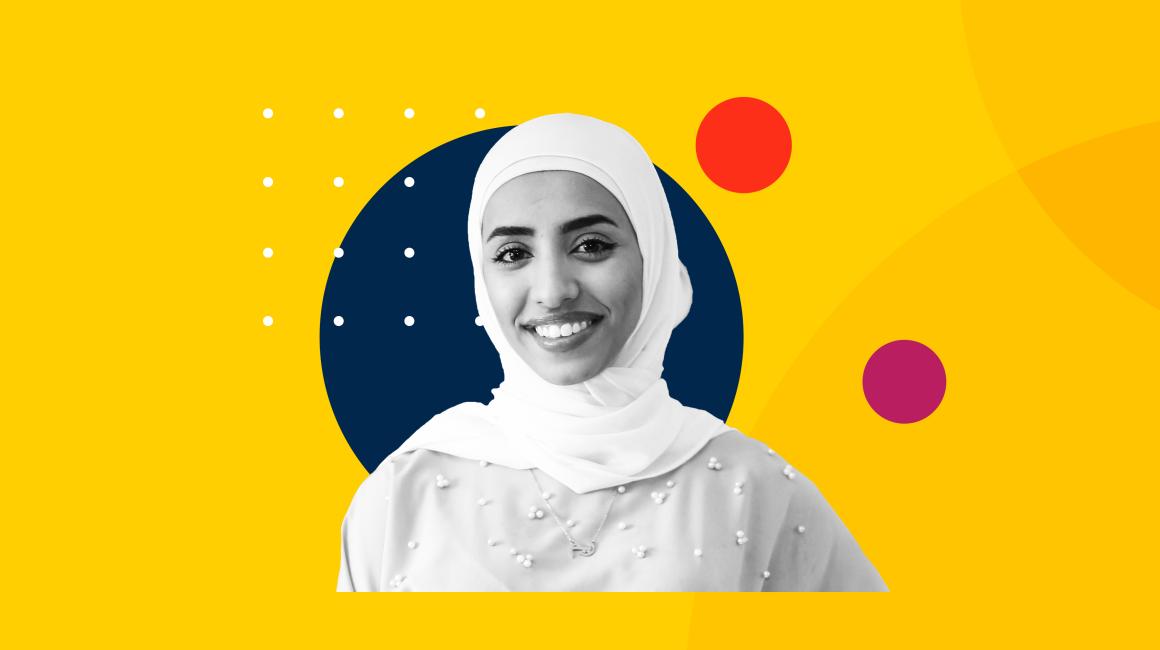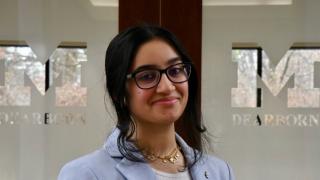
Even before Reem Omer set her sights on being the first person in her family to earn a college degree, she was well practiced in dealing with family expectations. Notably, not all of them carried a heavy burden, and she breaks into a laugh often when talking about all the ways her family depends on her. Omer, who moved to the U.S. with her mom from Yemen when she was 4, says being the “point person” for her immigrant family meant her parents looked to her for “all kinds of grown-up stuff,” whether that was making sense of tax forms or attending doctor’s appointments with younger siblings. And for her four sisters coming up behind her, she’s been their go-to for help with school projects, navigating the ups and downs of teenagerhood, and paving an easier path for their own college dreams. It’s like being “a role model for both sides,” Omer says.
Like a lot of first-generation students, she says getting to and through college wasn’t easy. Being from a really small high school, Omer says UM-Dearborn felt big when she got here, and there were times when she got lost trying to figure out what office did what. In general, one of the hardest things was just working up the nerve to ask for help. “It’s kind of hard to explain, but I think you have this sense that everybody knows things you don’t, and you don’t want to waste anybody’s time on things that you should know,” Omer says. There was also a learning curve navigating her new role within her family. Being in college meant that she had a more irregular schedule, stayed out later, and was meeting people that were outside her traditional social circles. “I think that was a bit of an adjustment for my mom. She would call me during the day because she’d need help with something, and I’d have to say, ‘I can’t right now, I’m in class.’ Or, she was super involved in my life and knew all my friends. In college, it’s different — meeting new people and getting involved with different organizations is just part of being a college student. So that was a change we all had to adjust to and talk through together.”
Studying engineering also pushed some boundaries. Not having any engineers in the family, Omer says she kind of had to explain to her parents what engineers did on a daily basis and why that intrigued her. Another extended family member bluntly told her “engineering is for guys.” Even within her own peer group, it was an unconventional choice: “Culturally, Yemeni women steer toward medical fields, and all my Yemeni friends from high school are nurses or social workers — like every single one of them.” Omer did flirt briefly with the idea of being a doctor, partly because she wanted to help people and partly because she likes being in charge. But ultimately her geek-level love of math steered her toward engineering, and specifically the “weird and cool” discipline of bioengineering. At UM-Dearborn, she found a kindred spirit in Associate Professor Joe Lo, with whom she did years of research in the area of microfluidics. “Engineers have this reputation of being very ‘by-the-book,’ but Professor Lo is so creative and open to new ideas. Even making mistakes, you don't ever see him get frustrated, it’s all part of it, you just keep going. And the work you do in a lab can be very repetitive and tedious, but he doesn’t get ever bored and I love that.”
Omer is doing her share of inspiring others these days too. Her recent efforts with the Yemeni Student Association raised more than $12,000 for water projects in Yemen, where an ongoing civil war has led to one of the world’s most devastating humanitarian crises. Here on campus, she was one of the founding members of the First Gen Student Organization, which has thrived during the pandemic and is devoted to supporting and raising the visibility of first-gen students. And as president of the Society of Women Engineers (SWE), she’s put herself out there as a visible example of what an unapologetic, Yemeni woman math geek can aspire to. “During winter break, some of the members from SWE went to the Southend of Dearborn, which is where a lot of Yemeni families live. And an 8th-grade Yemeni girl came up to me and asked why I chose engineering and how I was able to be comfortable in a male-dominated field. She also asked if there was a way SWE can help her figure out if engineering is really for her. Like, that is so cool to me! I didn’t choose this to be different or to set an example. But at the same time, I’m aware that it carries weight for people. It’s a message to girls that you can achieve what you want.”
Omer is aware that she’s resetting the boundaries in her family too, though she’s not out to break rules just for the sake of it. For example, right now, her job search is mostly focused on positions that are commuting distance from her family’s home. Moving away for work, getting her own place — those are things she knows would rock the boat, at least right now, and frankly she’s fine with living at home. “I struggle to even make noodles. It’s nice to have someone cook your meals.” She says her parents have always taught her and her sisters to be independent and pursue their passions — that “being a girl doesn’t come with limitations.” But it’s also important to stay connected to your culture, your beliefs, and the community that nurtured you. “I think that’s why I have a good relationship with my parents. I make an effort to understand their choices, and they do the same for me. We relate to each other as equals, and we’ve reached that point at an even younger age than most people. So that’s why I pick my battles.”
At the same time, Omer clearly enjoys that the battles she’s fighting are ones other young women might not have to.
###
Story by Lou Blouin

